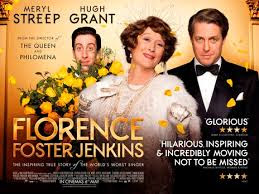by © Jane Freebury
It's fine
to belt out a song in the shower when you can't hold a tune, the acoustics are
good and no one is listening. But who among us wants to inflict this private
pleasure on the rest of the world?
The extraordinary
career of Florence Foster Jenkins during the 1930s-1940s in America begs a
question or three. Few of which are answered in this pleasant comedy about a
silly woman with more money than talent who insisted on appearing on stage in elaborate
costumes to sing arias for a round of applause.
Apparently Jenkins
got more than that, because sophisticated New Yorkers at her by-invitation-only
soirees and music society events clapped hard to disguise the sniggers and the
guffaws. She was a standing joke for years before the disastrous Carnegie Hall
concert in 1944 and the press exposure that ended her career and, in short
order, her life. Why so? We touch on this fleetingly in this new Stephen Frears
film – was it the syphilis her husband gave when young?– but it remains pretty
much unexamined.
Not one to
criticise, British director Stephen Frears brings his light touch to bear on
her story. He says Jenkins was preposterous, that he was nonetheless touched by
her and it shows, but the best will in the world has bought mixed results, and for
this viewer the conclusion that the film hasn't really got to grips with its
subject.
Even the
immense talent of Meryl Streep, the antithesis of the woman she was cast to
play, can't compensate for the fact that the script is incurious about what
really drove Jenkins, the reputed 'I can do it. I'll show them' mentality, and
why she was indulged for so long. Shades of the 21st century comedy of cringe?
Patron of
the arts and still an aspiring soprano in her 70s, Florence Foster Jenkins may
have been tone deaf and deaf to criticism too, but the problem was really her associates,
her common-law husband (Hugh Grant), and all the folk who depended on her for
their livelihood in the arts. She was a victim of her own patronage because no
one dared to confront her with the truth. She was, like, too big to fail.
We know
Streep can do anything, however I think she has done better. Her portrayal of
Jenkins as a girlish innocent, manipulated by her fond but faithless husband,
and by others who benefitted from her largesse, is sympathetic but not
compelling. Did she need to be quite
such a ditz? The steel that Jenkins apparently had in pursuing her career
regardless is nowhere to be seen, nor does the Nicholas Martin script explore
what it was about New York society at the time that allowed such nonsense to prevail.
In the
Orson Welles' classic of 1941, Citizen
Kane, Charles Foster Kane bought an opera house so that Susan, his wife of
meagre talent, could take the stage as an opera singer. She was miserable.
Florence needed no such encouragement, and was thrilled with it all. I'm still
not sure quite what to make of it.
It’s in
character for Frears to tackle stories of significance and lend his generous
perspective as in, say, My Beautiful
Laundrette, Philomena or The Queen.
It's what we like about him. Florence Foster Jenkins undoubtedly had a fascinating
backstory, however in neither this film nor the current French film Marguerite, also based on her life, do
we ever quite get to the bottom of it.
3 Stars
also posted at www.janefreeburywriter.com.au
